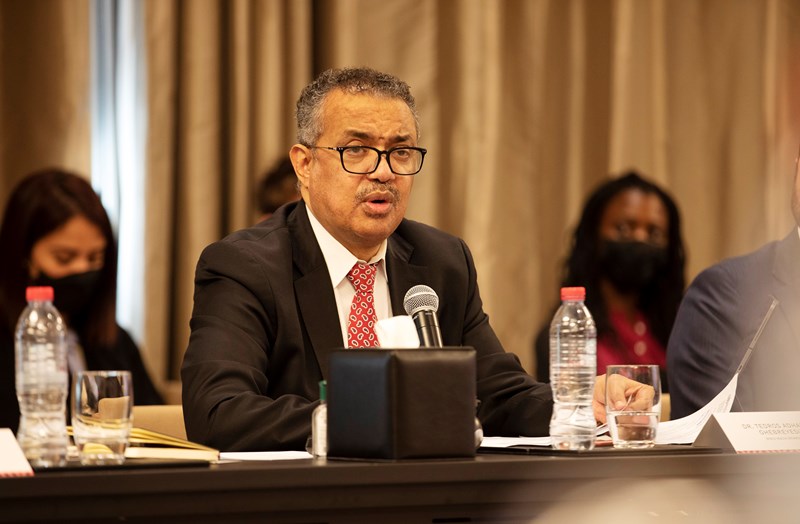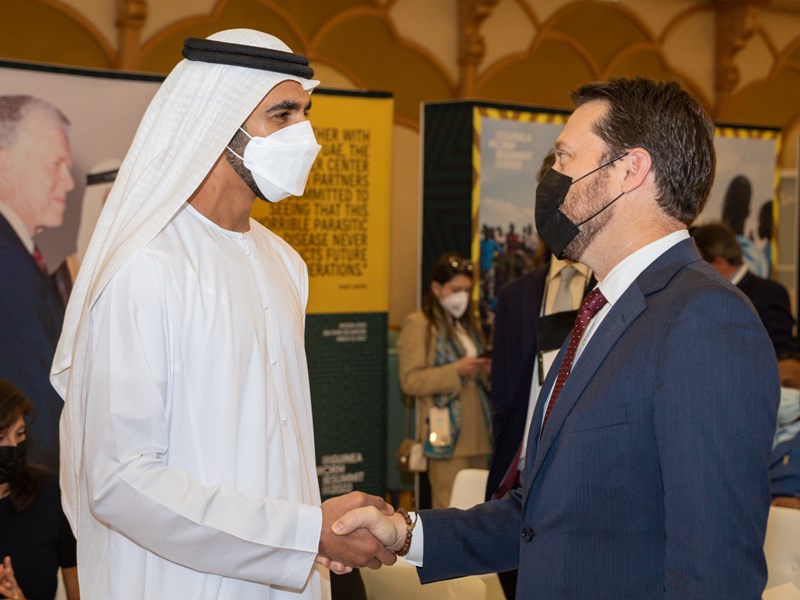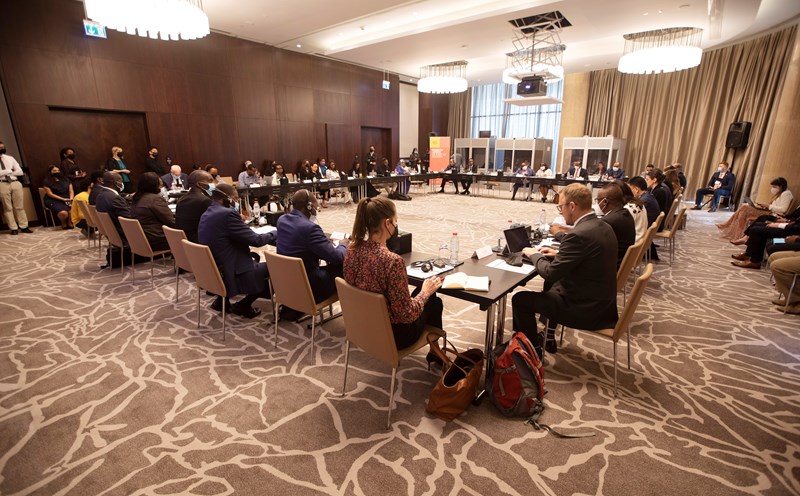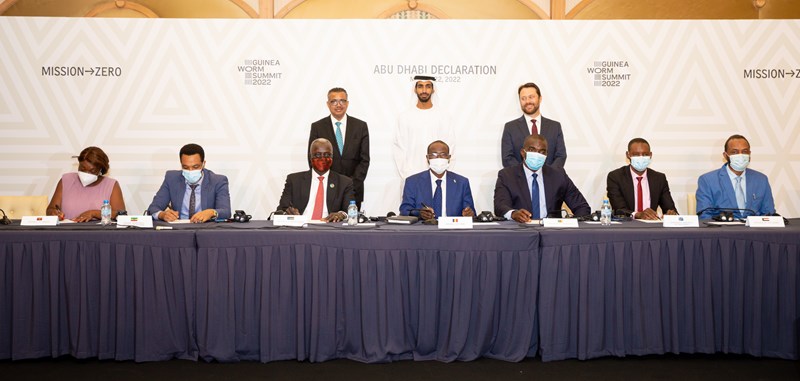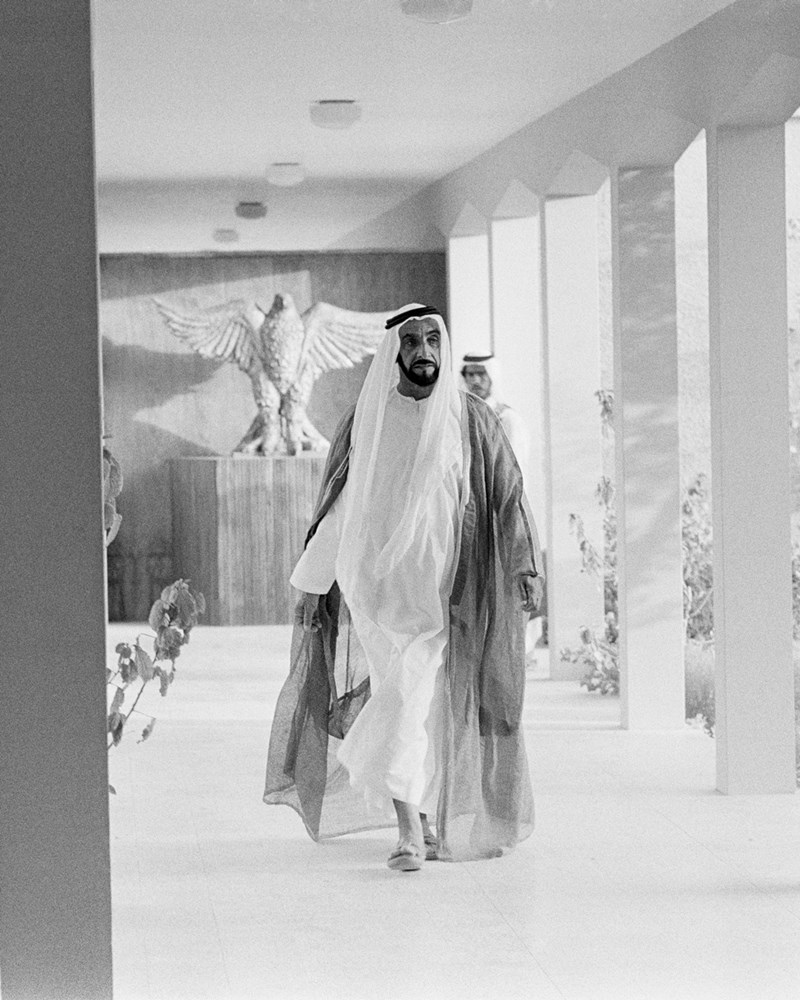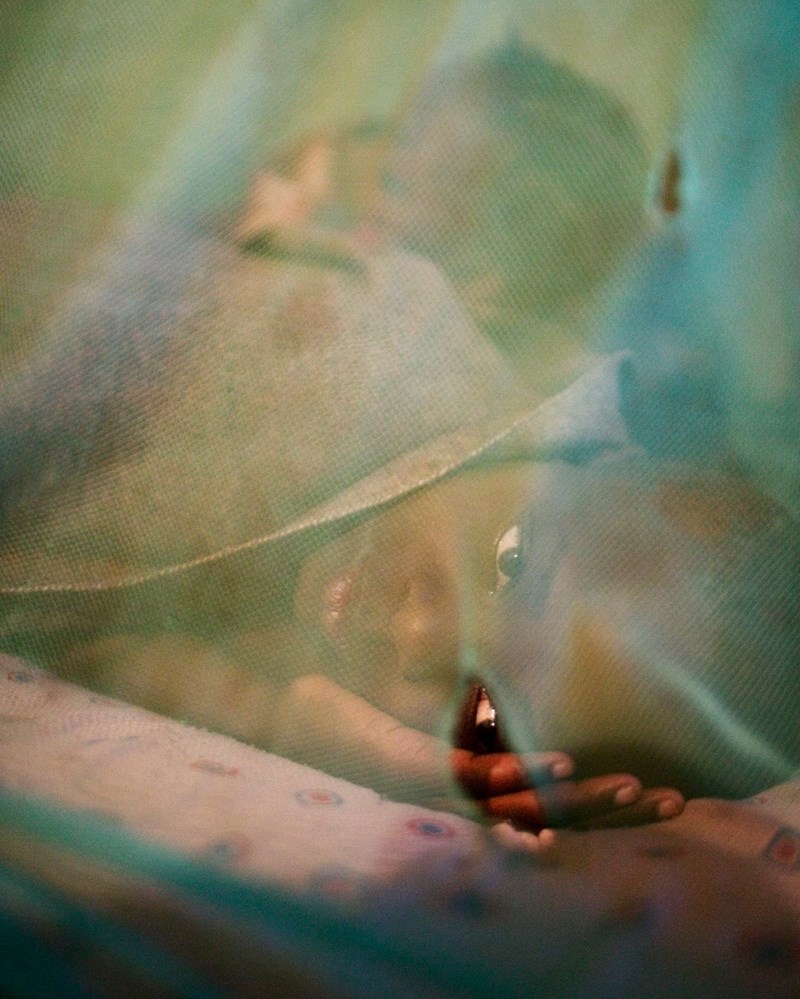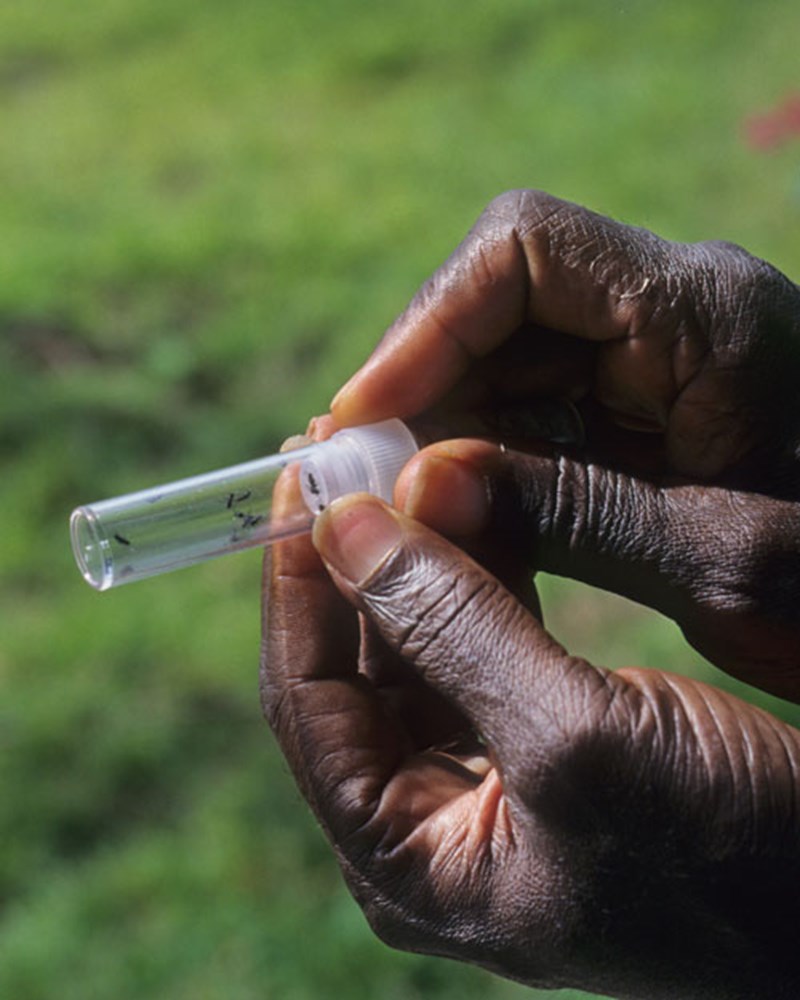Guinea worm disease: the last mile
Representatives from seven African countries affected by the world’s final few cases of Guinea worm gathered in Abu Dhabi to re-affirm their commitment to eradicating the ancient and crippling disease by 2030. The Guinea Worm Summit was co-hosted by the Carter Center and the Reaching the Last Mile, a portfolio of global health programmes focused on disease elimination funded by Sheikh Mohamed bin Zayed Al Nahyan, the Crown Prince of Abu Dhabi.
Attended by ministerial and technical delegations from Angola, Chad, Cameroon, South Sudan, Sudan, Ethiopia, and the Democratic Republic of Congo, the summit sought to spotlight country leadership and reinforce strategies to stamp out the last vestiges of this debilitating, yet preventable, disease.
The event culminated in the seven countries signing the Abu Dhabi Declaration on the Eradication of Guinea Worm Disease, agreeing to a set of different political, technical, and financial targets targeting elimination.
Commitments outlined in the declaration range from the provision of safe water and sufficient budget allocation for interventions, to increased cross-border collaboration and safe passage for health workers in conflict-affected zones.
The signing ceremony, which was held at UAE’s presidential palace, Qasr Al Watan, was witnessed by the Dr Tedros Adhanom Ghebreyesus, the director general of the World Health Organization (WHO), Sheikh Shakhboot bin Nahyan Al Nahyan, UAE Minister of State, Ministry of Foreign Affairs and International Cooperation, and Jason Carter, grandson of former US president Jimmy Carter and Carter Center board chair.
“This is a crucial moment to mark the beginning of the end of this disease,” Carter said. “Forever we will know that we gathered here with the very last countries in the very last mile… we are convinced that this will be the end.”
In 2021, there were just 15 cases of the waterborne parasite recorded globally. This is an historic low and represents a 99.9 per cent reduction on the more than 3.5 million human cases recorded back in 1986, when the Carter Center first began its campaign.
Guinea worm is now on course to become only the second human disease - after smallpox - to be eradicated.
“This is an incredible achievement. We have accomplished what many thought was impossible,” said Dr Ghebreyesus, who attended the two-day summit in the UAE capital.
However, warning that "the last mile is the most difficult”, the WHO chief told delegates: “Even as we celebrate our successes, we know the job is not finished yet. Hard-won gains can be easily lost. This work continues to require a holistic approach, from ministries of health and water to regional officials, to village communities.”
Guinea worm larvae are ingested in dirty water, growing internally to as long as a metre before pushing, excruciatingly, through the skin over several weeks. There is no treatment, except to wind the emerging worm around a stick to speed its removal.
Sufferers may seek relief by immersing their limbs in water, stimulating the worm to release its larvae and renewing the cycle of infection.
It is one of more than a dozen neglected tropical diseases (NTDs), such as river blindness and leprosy, which blind, disfigure and disable millions of the world’s poorest people every year, preventing them from working or attending school and costing affected countries billions of dollars in lost productivity.
There is no vaccine or treatment for Guinea worm, but it can be prevented. This is done mainly through community outreach to educate people to filter their water and report suspected cases, and when required, treating water with larvicide.
The fight against Guinea worm disease began in the late 1980s under the leadership of former US president, Jimmy Carter and grew thanks to funding support from the late Sheikh Zayed bin Sultan Al Nahyan, the founding father of the UAE.
The battle has been long and painstaking, hampered by conflict and poor infrastructure, and most recently, infections in animals.
Despite these challenges, the 15 cases reported in humans during 2021 were found in just four countries: Chad, South Sudan, Ethiopia, and Mali.
Encouragingly, Angola, which had its first incidence of Guinea worm in 2018 (detected during a polio vaccination campaign) had no reports last year, and Cameroon recorded only a handful of infections in dogs, which are believed most likely to have come from across the border in Chad.
Moreover Sudan, which has had no cases since 2013, and the Democratic Republic of Congo, which has never reported any cases, have now both submitted applications to the WHO to be certified as free from the disease.
“The time is now… There’s a lot of momentum and it’s now or never. This is our chance."
Adam Weiss, director, Guinea worm eradication program, the Carter Center.
Sara Elyas Elameer, a technical advisor to the Ministry of Health in Sudan, said she hoped they would receive their eradication certification by 2023. “This is a big achievement for us, and we are grateful for the support and partnerships we have had to help us get here.”
But in the long fight against Guinea worm, for all the steps forward, there are often a few backwards, with the final few cases typically found in the most hard-to-reach areas.
In South Sudan, for example, which in 2006 had more than 20,000 cases, celebrated in 2018 when thought it had interrupted transmission, but then new reports emerged, with four cases confirmed in the last 12 months.
In response to this setback, the country is pushing hard to roll out more community-based surveillance and it is stepping up its cross-border work. Dr John Rumunu Pasquale, director general for preventive and public health at South Sudan's National Ministry of Health, said he was “hopeful” the country would get to Zero by 2030.
“This summit and this declaration mark a very important occasion,” he explained. “It means a lot to us in South Sudan as we are reaching close to the finish line of the race against Guinea worm disease.
“It has been a long journey and there have been many challenges,” he said. “We are a country coming from war with weak infrastructure and less than 50 percent of the population having access to healthcare within a five-mile radius.”
The power of partnership
At a meeting in 1990, former US President Jimmy Carter convinced Sheikh Zayed bin Sultan Al Nahyan, the UAE’s founding father, to support his efforts to vanquish Guinea worm. That first gift from Sheikh Zayed to the Carter Center was the catalyst for a decades-long partnership that has seen the UAE give more than $35m to the fight to vanquish Guinea worm, including a new $10m donation announced last year.
Since the passing of Sheikh Zayed, his son and Abu Dhabi’s crown prince, Sheikh Mohammed bin Zayed, has picked up the baton to focus his philanthropy and influence on ending preventable diseases, through Reaching the Last Mile, a portfolio of global health programmes working towards disease elimination.
“It is a privilege to continue the legacy of the founder of our nation, Sheikh Zayed bin Sultan Al Nahyan, who believed no-one should suffer from a preventable disease," said Sheikh Shakhboot bin Nahyan Al Nahyan, Minister of State, Ministry of Foreign Affairs and International Cooperation, at the signing of the Abu Dhabi declaration. "Reaching the last mile of Guinea worm disease cannot come soon enough,” he added.
Echoing this celebration of his family’s connection with the Al Nahyans, Jason Carter, who brought his 15-year-old son, Henry, to the Guinea Worm Summit, said: “On this moment, on this day, here in this place and with the partnerships that we've established, we are convinced that this will be the end.”
Abeer Al Fouti, executive manager for global initiatives at Saudi Arabia’s Alwaleed Philanthropies, another long-time donor to the Carter Center’s health programmes, said: “This is a great reflection of the power of partnerships. It sends a strong message of how important it is to stay committed and work with others to achieve your vision.”
Acknowledging the country-led efforts against the disease, Adam Weiss, director of the Guinea worm Eradication Program at the Carter Center, said the progress made by the ministries in the remaining affected countries, could not be overstated.
“The time is now," Weiss told Philanthropy Age. “There’s a lot of momentum at the community level to see it done. There’s a lot of momentum politically, and it’s now or never. This is our chance to throw everything at it and get it done as quickly as possible.”
He added: “It is mind-boggling how far this programme has come. This is the lowest number of cases in documented history, and we know that we’ve averted at least 80 million cases.”
In addition to the high-level commitments, the Guinea Worm Summit also facilitated important bilateral exchanges, particularly around cross-border transmission issues.
“This is the first time in more than two years that people have been able to come together in person,” noted Paige Alexander, CEO of the Carter Center.
“Now, because of these bilateral discussions, we have been able to learn directly from the ministries in the affected countries where their pain points are, how we as donors can be more helpful, and what support they need to get to the end of the road.” - PA
